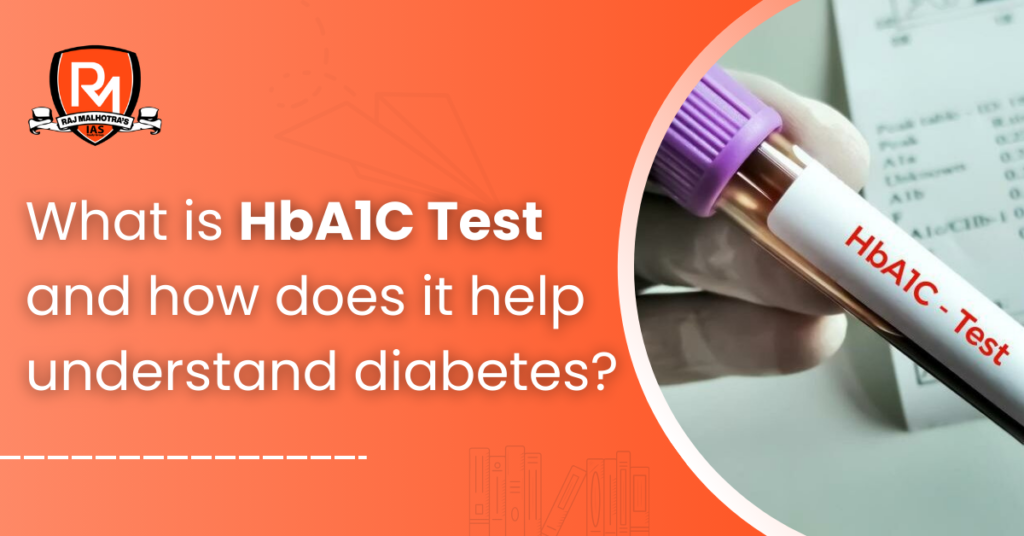Recently, there was an article in The Hindu discussing a disease called Diabetes, sometimes referred to as “diabetes lite.” This article is quite important from the perspective of Anthropology, especially for those preparing for exams in this field. Today, Raj IAS Academy the Best HAS Coaching Institute in Chandigarh and the top UPSC preparation institute will share one aspect of the article, which is about a test called the HbA1C test.
What is diabetes?
It’s a chronic condition that affects how your body regulates blood sugar levels. Basically, if someone has diabetes, it means that the level of sugar in their blood is higher than it should be. This happens because the body struggles to regulate blood sugar properly. When we eat food, our body extracts energy from it, including sugar. Insulin, a hormone produced by the pancreas, helps move sugar from the blood into cells for energy. However, if insulin levels are not right, the body can’t regulate blood sugar properly, leading to diabetes.
Check more about insulin.
All about HbA1C test
Now, let’s talk about the HbA1C test. It’s a test used to measure average blood sugar levels over the past two to three months. It’s recommended that people over 30 years old go for checkups for diabetes. The Indian Council for Medical Research suggests getting this test done regularly.
The HbA1C test has limitations. It may not give a 100% accurate result in some cases, especially if someone has conditions like thalassemia or certain hemoglobin variants. So, while the test is essential, it’s not the only factor to consider when diagnosing diabetes.
Let’s discuss it more with the Best HAS Coaching Institute in Chandigarh, since, understanding diabetes and tests like the HbA1C test is important, especially from an anthropological perspective. It helps us grasp the impact of diabetes on society and how we can better manage and prevent it.
Detailed discussion with Raj IAS Academy:
When you eat food, your body breaks it down into sugar, which travels into your bloodstream. To use this sugar for energy, your body needs a hormone called insulin, made by the pancreas. Insulin acts like a key to unlock cells so sugar can enter and provide energy.If your blood sugar is too high, your pancreas makes more insulin to help process it. If your blood sugar is too low because you haven’t eaten, your pancreas slows down insulin production.
Insulin is crucial for keeping sugar levels in your cells stable. Sometimes, the pancreas doesn’t make enough insulin, leading to two types of diabetes: Type 1 and Type 2. In Type 1, the body’s immune system attacks the pancreas cells that make insulin. In Type 2, the body doesn’t respond well to insulin or doesn’t make enough of it.
People with Type 1 diabetes often need insulin injections to regulate their sugar levels. Type 2 diabetes is often related to lifestyle choices like diet and exercise. In countries like India, where diabetes is common, most cases are Type 2, often because of lifestyle factors.
It’s important not only for exams but also for your health. Understanding how insulin works can help manage diabetes and improve treatment plans.
Basic Information about Diabetes:
Diabetes Types: There are two main types – Type 1 and Type 2. Type 1 is when the body doesn’t make insulin. Type 2 is when the body can’t use insulin well or doesn’t make enough.
Causes: Type 2 diabetes can be caused by things like not eating healthy, not exercising enough, being overweight, or having a lot of stress.
Insulin Function: Insulin helps control blood sugar by turning glucose into energy. In Type 2 diabetes, either the body doesn’t make enough insulin or it doesn’t use it well.
Symptoms: Signs of diabetes include feeling thirsty a lot, needing to pee often, feeling very hungry, and losing weight without trying.
Diagnostic Tests: Doctors use tests to check blood sugar levels. One important test is the A1C test, which shows average blood sugar levels over a few months.
Management: Managing diabetes means eating healthy, staying active, checking blood sugar levels regularly, and taking medicine if needed. Some people may need insulin shots.
Complications: If diabetes isn’t controlled, it can cause problems like heart disease, kidney damage, nerve issues, and eye problems.
Towards the End:
In the past, doctors used to test for diabetes by observing ants’ behavior around urine samples. If ants were attracted to the urine, it meant a high sugar content indicated diabetes. But this method wasn’t very reliable. Nowadays, we have better ways to test for diabetes. Doctors take blood samples to measure the sugar level in the bloodstream. Glucose attaches to a protein called hemoglobin in red blood cells. By measuring this attachment, we can determine if a high glucose concentration in the blood suggests diabetes.
One important test is called the HbA1c test. It measures how much glucose is attached to hemoglobin over the past few months. If the HbA1c level is below 5.7%, it’s normal. Between 5.7% and 6.4%, it indicates prediabetes. However, the HbA1c test has some limitations. For example, it may not be accurate for people with certain blood conditions. Also, it gives an average reading over time, so it may not show immediate changes in blood sugar levels.
So, while the HbA1c test is helpful, it’s not the only test used for diabetes. Regular monitoring and talking to doctors are important for managing diabetes effectively. This is a reminder from Raj IAS Academy to stay healthy and be aware of such updates from health departments.






